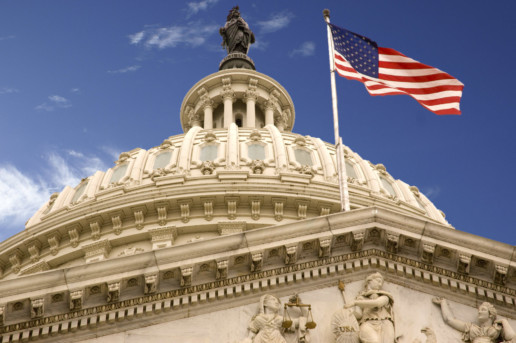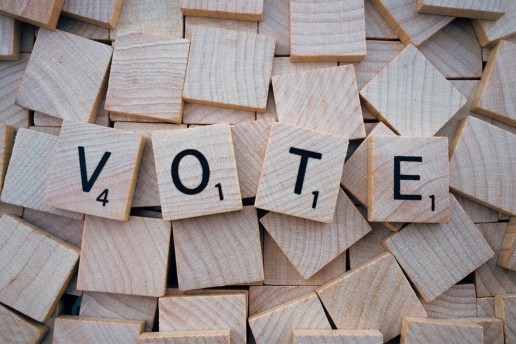Civic time off: The benefit getting employees to the polls
Does your organization offer civic time off as an employee benefit? Some companies are looking to change low voter engagement by offering new benefits to employees who vote. Read on to learn more.
Voter engagement for midterm engagement historically has been poor. Some companies are offering new benefits to change that — even offering the day off to encourage employees to vote.
American employers that provide paid time off stands at about 44%, a record high, according to the latest research from the Society for Human Resource Management survey. The human resource organization estimates 29% of these companies offer employers more than an hour or two of voting time.
Despite such accommodations, about 60% of Americans didn’t vote in the last midterm election, according to research by Vote.org, a voters’ advocacy organization. The biggest obstacle to voting was scheduling conflicts; 35% of people said they couldn’t vote because of work and school.
“There’s no federal protection for voting leave for employees, which means it’s up to the states to set their own policies. Policies are inconsistent, but some states have no laws at all,” says Colette Kessler, director of partnerships at Vote.org. “This puts employers in a powerful position to enable employees to get to vote.”
But as more Americans prepare to head to the polls for key elections in 46 states, employers including Patagonia, Zenefits and Honest Tea, are opting to give employees paid time off to make their voice heard.
Outdoor retailer Patagonia, for instance, is closing its stores as well as its headquarters and distribution and customer-service center to give employees paid time off to vote. “No American should have to choose between a paycheck and fulfilling his or her duty as a citizen,” Patagonia CEO Rose Marcario wrote in a company blog post.
Meanwhile, human resource software company Zenefits implemented a new program in which employees can take time off to vote the same way they would for a doctor’s appointment. Voting won’t cut into their sick days, vacation time or paid time off. Instead, voting gets its own designation — civic time off, or CTO. That free time can be used for voting, volunteering for a candidate, attending a school board meeting or canvassing.
“Civic time off is a new concept for the industry, and we’re excited to be among the first to offer such a benefit,” says Beth Steinberg, chief people officer at Zenefits, in a letter on the company blog. “At Zenefits, it’s been a priority to help build our team’s skill set not only as it pertains to professional career growth, but also to encourage their development outside of the workplace as engaged and empowered citizens.”
Vote.org consults with companies interested in implementing a CTO program. Based on individual business models and company culture, the organization will suggest either full days off, half days or flexible scheduling.
“One benefit we’re really excited about is offering employees a half day. It gives employees the ability to get to their polling places and do their morning routine — like getting the kids to school and running errands,” Kessler says. “And later they can convene with colleagues and celebrate Election Day. We’re seeing HR teams create afternoon lunch parties to celebrate.”
Kessler says some companies are hesitant to provide time off for voting because they’re worried about losing productivity. However, most of the companies she’s worked with have been enthusiastic about providing their workforce with time off to vote.
“We don’t see any drawbacks to offering our employees flexibility on Election Day,” says Seth Goldman, co-founder and CEO emeritus of beverage company Honest Tea, which allows its 50 employees to take a few hours of paid time off go to the polls on Election Day, at their convenience. “It’s a right we all should be proud to recognize and support however we can.”
SOURCE: Webster, K. (5 November 2018) "Civic time off: The benefit getting employees to the polls" (Web Blog Post). Retrieved from: https://www.employeebenefitadviser.com/news/civic-time-off-the-benefit-getting-employees-to-the-polls?feed=00000152-a2fb-d118-ab57-b3ff6e310000
How to Handle Employee Requests for Time Off to Vote
Do you know how to handle employee requests for time off to vote? In some states, it is a requirement to give employees time off to vote. Read this blog post to learn more.
Many employees will be eligible to cast their ballot on Nov. 6, but will they have time to vote? Some states require employers to give workers time off to vote, and even in states that don't, some businesses are finding other ways to get employees to the polls.
With Election Day around the corner, employers should be mindful that, while no federal law provides employees leave to vote, many states have enacted laws in this area, said Marilyn Clark, an attorney with Dorsey & Whitney in Minneapolis. Depending on the state, employers may have to give workers notice about their voting rights and provide paid or unpaid time off to vote.
Even in states where there is no voting leave law, it is good practice to let employees take up to two hours of paid time off to vote if there isn't enough time for the employee to vote outside of working hours. "Encouraging and not discouraging employees should be the general rule," said Robert Nobile, an attorney with Seyfarth Shaw in New York City.
Encourage Employees
"Here in the United States, too many people don't vote because they don't have time due to jobs, child care and other responsibilities," said Donna Norton, executive vice president of MomsRising, an organization of more than 1 million mothers and their families. "Getting to the polls can be especially challenging for people in rural communities [or] single-parent households, and those who are juggling multiple jobs."
About 4 in 10 eligible voters did not vote in the 2016 presidential election, according to research conducted by Nonprofit VOTE and the U.S. Elections Project. And voter turnout has been historically lower for midterm elections, such as this year's, which are held near the midpoint of a president's four-year term, according to Pew Research Center.
"Businesses can help solve this problem by making sure that all employees have paid time off to vote," Norton said.
Some employers are offering solutions by making Election Day a corporate holiday, offering a few hours of paid time off for employees to vote and giving employees information about early and absentee voting, according to TheWashington Post.
Giving employees time off to participate in civic or community activities tends to improve worker performance, said Katina Sawyer, Ph.D., an assistant professor of management at George Washington University. Employers who are offering paid time off to vote will likely reap the benefits through improved employee attitudes and performance.
Know the Law
Employers in states with voting-leave laws should be familiar with the specific requirements, as some state laws have a lot of details. Even in states without such laws on the books, employers should check to see if there are any local voting leave ordinances in their cities.
Employers required to give workers time off to vote should plan for adequate work coverage to ensure that all employees can take time off, Clark said.
In many states, the employer may ask workers to give advance notice if they need time off and may require that workers take that leave at a specific time of the workday. In some states where leave is paid, employers might have the right to ask employees to prove they actually voted. Most states prohibit employers from disciplining or firing an employee who takes time off from work to vote.
"Ultimately, fostering an environment that generally encourages employees to exercise this important right is a good practice to mitigate the risk of a potential retaliation claim," Clark said.
Although state laws vary, "the general theme across the U.S. with respect to voting laws is that employees will be given time off to vote if there is insufficient time between the time the polls open and close within the state and the time employees start and finish work," Nobile said. "Typically, two to three consecutive nonworking hours between the opening and closing of the polls is deemed sufficient."
Some state laws provide unpaid leave to vote or do not address whether the leave must be paid. Oregon and Washington no longer have voting leave laws because they are "vote-by-mail" states.

In some states, such as California and New York, employers must post notices in the workplace before Election Day to inform employees of their rights. Employers might have to pay penalties if they don't comply.
The consequences for denying employees their voting rights can be harsh, with some states even imposing criminal penalties, Clark noted.
Create a Policy
At a minimum, employers should adopt a policy spelling out the voting rights available to employees under applicable laws, Clark said. For businesses that operate in states that don't have a voting-leave law, employers may still wish to adopt a policy outlining their expectations about time off for voting.
Multistate employers may elect to adopt a single policy that includes the most employee-friendly provisions of the state and local laws that cover them. "By taking this approach, employers avoid the administrative burden of adopting and promulgating multiple policies for employees working in different locales," Clark said. All voting-leave policies should be sure to include strong anti-retaliation provisions, which make clear that the employer will not take any adverse action against employees for exercising their voting rights.
"It's important to remember that the law sets the floor," said Bryan Stillwagon, an attorney with Sherman & Howard in Atlanta. "Companies with the happiest and most-engaged employees recognize that positive morale comes from doing more than what is required."
Nagele-Piazza, L. (29 October 2018) "How to Handle Employee Request for Time Off to Vote" (Web Blog Post). Retrieved from https://www.shrm.org/ResourcesAndTools/legal-and-compliance/state-and-local-updates/Pages/How-to-Handle-Employee-Requests-for-Time-Off-to-Vote.aspx
Dana Wilkie contributed to this article.


